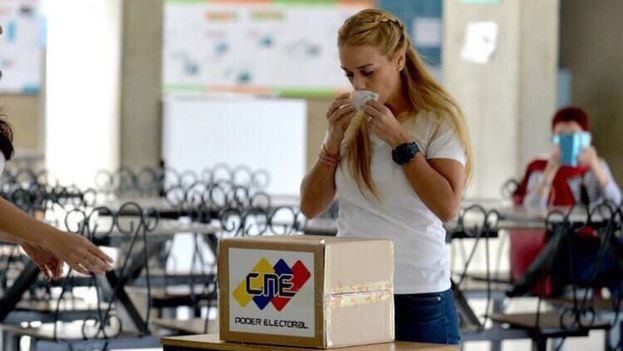
![]() 14ymedio, Jorge Hernandez Fonseca, 8 December 2015 — The surprising, though expected, results of the Venezuelan elections have a fairly simple explanation if we consider that it implies the exit from the Venezuelan political scene of Disdado Cabello, Nicolas Maduro’s major enemy and, therefore, also that of the Castro brothers.
14ymedio, Jorge Hernandez Fonseca, 8 December 2015 — The surprising, though expected, results of the Venezuelan elections have a fairly simple explanation if we consider that it implies the exit from the Venezuelan political scene of Disdado Cabello, Nicolas Maduro’s major enemy and, therefore, also that of the Castro brothers.
President Maduro’s last minute change in attitude towards the electoral process could be an order from Havana with an eye to resolving, with the triumph of the opposition, two aspects that are of major concern to the Castros: the current power of the president of the Venezuelan National Assembly, Diosdado Cabello, enemy of Cuba and therefore of Maduro; and in second place, avoiding the international blow that would derive from giving the president-elect of Argentina Mauricio Marcri’s a legal basis for his proposal to apply the “democracy clause” against Venezuela to expel it from Mercosur, the southern common market bloc.
In the final days before the elections we witnessed a radical change in the position of Nicolas Maduro regarding the electoral process. From original messages warning he would take violently to the streets, he switched to an attitude of apologizing for his words saying he “had been misinterpreted” and assuring that the government would accept the results.
He received his (former enemies), the Latin American ex-presidents in the Government Palace (sent – unsuccessfully – to expel Cabello from Venezuela), and allowed opposition politician Leopoldo Lopez to vote from prison, among other clear changes in his posture, which can only be explained if there had been an order from Havana to that effect.
Politics is a complex game of chess. The victory of the opposition in these parliamentary elections is a defeat for Nicolas Maduro, but there is no doubt that the main person defeated is Diosdado Cabello, and that this objective is greatly prioritized in Havana and will be very well received by Maduro. Of course, as the island is already preparing for how to deal with an opposition legislature, because Maduro has another three years in office, there is enough time – from the Cuban point of view – to neutralize it, having gained time.
Venturing a hypothesis, after the Cuban directive to accept the popular will in Venezuela, it could be the current US-Cuba relationship and possible negotiations that led Havana to influence Caracas in this regard, with the intention of initiating a thaw between Washington and Caracas without removing Maduro from power, only Cabello. The current President of the National Assembly is accused of being a drug kingpin in Venezuela, and we have seen Havana’s solution to this earlier, with accusations against Cuban generals (and ultimately the execution of a national hero General Ochoa).
It is still too early to speculate with a reasonable degree of accuracy, but a statement of opposition victory readily accepted by President Maduro – the same man who had previously spoken of “massacres” if this were to happen – merits further investigation beyond saying “he complied with the popular will,” when we know that for the Castro brothers there is no reason other than always ensuring the protection of their interests.
Thus the acceptance of the Venezuelan opposition victory could have been driven by the division within the ruling party and the Cubans’ desire to get rid of a dangerous enemy.
